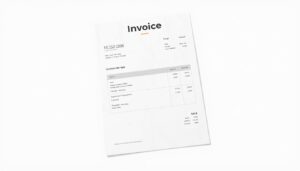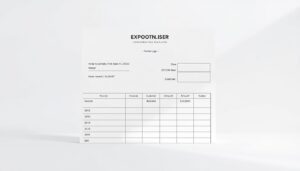As Warren Buffett once said, “Risk comes from not knowing what you’re doing.” In the world of international trade, understanding the essentials is key to minimizing risks and ensuring smooth operations. One such essential is the 14-digit identifier, a critical component for cross-border transactions.
This unique identifier, issued by RBI-authorized banks, plays a pivotal role in legalizing international payments. It ensures compliance with RBI regulations and DGFT norms, making it mandatory for customs clearance at Indian ports. Without it, exporters face significant hurdles in their trade ventures.
Managing export documentation can be complex, but tools like Karbon simplify the process. Karbon helps businesses streamline their documentation, ensuring accuracy and efficiency in every step of the registration process. By leveraging such solutions, exporters can focus on growing their global presence.
Key Takeaways
- The 14-digit identifier is essential for cross-border transactions.
- It is issued by RBI-authorized banks and ensures compliance with regulations.
- Customs clearance at Indian ports requires this identifier.
- Karbon is a reliable tool for managing export documentation.
- Understanding the registration process minimizes risks in international trade.
What is an AD Code?
In the realm of international trade, the Authorized Dealer Code (AD Code) is a cornerstone for seamless transactions. This 14-digit identifier, issued by RBI-approved banks, links all cross-border transactions to specific bank accounts. It ensures compliance with regulatory norms and facilitates smooth customs clearance at Indian ports.
The AD Code serves a dual purpose. First, it acts as a legal requirement for customs clearance, ensuring that goods and services move across borders without delays. Second, it tracks foreign exchange transactions, providing transparency and accountability in financial operations.
RBI-authorized banks issue this dealer code after a thorough verification process. Once obtained, it is valid across all Indian customs ports, making it a universal identifier for exporters. The AD Code is also integrated with the ICEGATE portal, a digital platform for customs operations, streamlining the entire process.
Think of the AD Code as a “business passport” for international trade. It not only simplifies documentation but also ensures compliance with global trade regulations. For businesses dealing in goods and services, this identifier is indispensable for maintaining efficiency and credibility in the global market.
Why is AD Code Registration Important?
Efficient cross-border operations hinge on proper documentation. The registration of an AD Code is a critical step for businesses engaged in international trade. It ensures compliance with regulatory norms and streamlines the entire export process.
One of the primary reasons for this registration is its role in shipping bill generation. Without it, businesses cannot generate shipping bills, which are essential for customs clearance. Additionally, it enables GST refunds and duty drawbacks, providing financial benefits to exporters.
AD Code registration is also mandatory for ICEGATE registration. ICEGATE is a digital platform that simplifies customs operations, making it easier for businesses to manage their transactions. By registering, businesses gain access to a streamlined process that reduces delays and enhances efficiency.
Here are some key benefits of AD Code registration:
- Prevents customs clearance delays, speeding up processing by 30-45%.
- Access to government incentives worth 5-12% of shipment value.
- Ensures RBI-compliant foreign currency transactions.
- Enables automated payment reconciliation for better transparency.
- Karbon serves as a reliable compliance monitoring solution.
For any business involved in international trade, AD Code registration is not just a requirement but a strategic advantage. It ensures smooth operations, compliance with regulations, and access to financial benefits, making it indispensable for global success.
Who Needs an AD Code?
In the dynamic world of global commerce, certain identifiers are indispensable. The AD Code is one such essential, particularly for exporters and businesses engaged in international trade. It ensures compliance with regulatory norms and facilitates smooth operations across borders.
- Exporters with an IEC license: With over 6.2 million Indian exporters, this is a mandatory requirement for all IEC holders.
- Businesses handling foreign investments: Entities receiving foreign funds must obtain this identifier to ensure compliance.
- Entities making international remittances: Whether for goods or services, this code is critical for cross-border transactions.
- Cross-border e-commerce operations: For businesses involved in imports or exports, the AD Code is non-negotiable.
- Exceptions: Only diplomatic missions and UN agency shipments are exempt from this requirement.
For any business operating in the global market, understanding and obtaining an AD Code is not just a regulatory necessity but a strategic advantage. It ensures seamless operations, compliance, and access to financial benefits, making it a cornerstone of international trade.
How to Register AD Code for Exports: Step-by-Step Process
Navigating the complexities of international trade requires precise steps and adherence to regulatory standards. Obtaining the 14-digit identifier involves a structured process that ensures compliance and efficiency. Below is a detailed guide to help businesses complete this essential task seamlessly.
Step 1: Contact an Authorized Dealer Bank
The first step is to approach one of the 52 RBI-approved AD category-I banks. These banks are authorized to issue the identifier and guide businesses through the process. Ensure your company has a current account with the chosen bank, as this is a prerequisite for the application.
Step 2: Gather Required Documents
Preparation is key to a smooth application process. Businesses must compile necessary documents, including their IEC license, KYC details, and proof of current account. Tools like Karbon simplify this step by offering a comprehensive document checklist, ensuring nothing is overlooked.
Step 3: Submit the Application
Once all documents are ready, submit the application to the authorized bank. The bank will initiate a KYC verification process, which typically takes 2-4 days. This step ensures all information is accurate and compliant with regulatory norms.
Step 4: Verification and Issuance
After successful verification, the bank issues the 14-digit identifier. This step usually takes 3-7 days, depending on the bank’s internal processes. Once issued, the identifier is valid across all Indian customs ports, making it a universal tool for exporters.
Step 5: Register on ICEGATE Portal
The final step involves registering the identifier on the ICEGATE portal. This digital platform uses a dual OTP authentication system for secure access. Registration ensures seamless integration with customs operations, reducing delays and enhancing efficiency.
By following these steps, businesses can ensure compliance, streamline operations, and focus on expanding their global presence. Leveraging tools like Karbon further simplifies the process, making it easier to manage documentation and meet regulatory requirements.
Documents Required for AD Code Registration
Accurate documentation is the backbone of seamless international trade operations. For businesses looking to obtain the 14-digit identifier, preparing the right documents is crucial. This ensures compliance with regulatory norms and speeds up the application process.
Here’s a complete checklist of the 9 essential documents required:
- PAN card: A mandatory identification document for all businesses.
- IEC license: Proof of eligibility for international trade operations.
- KYC details: Includes identity and address proof of the business owner.
- Proof of current account: Issued by the authorized bank.
- Digital signatures: Required for secure online submissions.
- Notarized documents: For international entities, notarization is essential.
- IRN/DRN generation: A unique reference number for tracking applications.
- PAN-GST-IEC cross-verification: Ensures consistency across all registrations.
- Additional certifications: Depending on the nature of goods services.
Notarization is particularly important for international entities. It validates the authenticity of documents and ensures they meet global standards. Tools like Karbon simplify this process by offering digital storage capabilities, making it easier to manage and retrieve files.
Common reasons for application rejection include incomplete submissions (23% of cases) and mismatched details during PAN-GST-IEC cross-verification. By leveraging Karbon’s comprehensive checklist, businesses can avoid these pitfalls and ensure a smooth registration process.
Proper documentation not only speeds up the process but also ensures compliance with regulatory norms. For businesses involved in export, this step is critical for maintaining efficiency and credibility in international trade.
Benefits of AD Code Registration
For businesses engaged in global trade, the AD Code offers a range of strategic advantages. This identifier streamlines operations, ensures compliance, and unlocks financial benefits, making it indispensable for international success.
One of the most significant benefits is faster customs clearance. With an AD Code, processing times improve by up to 18%, reducing delays and enhancing efficiency. This is particularly valuable for exports, where timely delivery is critical.
Another advantage is access to direct duty drawback credits. These automatic tax refund mechanisms provide financial relief, allowing businesses to reinvest in their operations. Additionally, the code simplifies foreign investment tracking, ensuring transparency in cross-border transactions.
Export promotion schemes are another key benefit. By registering, businesses gain access to government incentives, which can significantly boost profitability. These schemes are designed to support growth and competitiveness in the global market.
Finally, the AD Code reduces RBI reporting burdens. Tools like Karbon further enhance this benefit by offering automated compliance reporting. This ensures accuracy and efficiency, allowing businesses to focus on their core operations.
In summary, the AD Code is more than just a regulatory requirement. It is a strategic tool that enhances efficiency, ensures compliance, and unlocks financial benefits for businesses engaged in international trade.
Common Challenges in AD Code Registration
Securing an AD Code is essential, but the process isn’t without its hurdles. Many businesses face obstacles that can delay or even derail their applications. Understanding these challenges is the first step toward overcoming them.
One major issue is mismatched details across PAN, IEC, and GST data. Inconsistencies in these records lead to 34% of application rejections. Ensuring all information aligns perfectly is critical for a smooth process.
Technical glitches on the ICEGATE portal are another common problem. OTP delivery failures often stall the process, causing frustration and delays. Staying patient and retrying during off-peak hours can help mitigate this issue.
Bank-related delays also pose significant challenges. Errors in certificate formats or slow verification by authorities can extend the timeline. Tools like Karbon offer real-time application tracking, helping businesses stay informed and proactive.
Here are some practical solutions to these challenges:
- Double-check all documentation for accuracy before submission.
- Use Karbon’s automated tools to ensure PAN-IEC-GST data consistency.
- Contact the ICEGATE helpline for assistance with technical issues.
- Work closely with your bank to resolve certificate format errors promptly.
- Leverage Karbon’s compliance monitoring to avoid last-minute surprises.
By addressing these challenges head-on, businesses can streamline their AD Code registration process. With the right tools and strategies, even the most common hurdles can be overcome efficiently.
Maintaining and Updating Your AD Code
Ensuring the accuracy and validity of your AD Code is crucial for seamless international trade operations. This identifier remains valid for a lifetime as long as your account is active. However, businesses must stay vigilant about updates to avoid disruptions.
Changes in account details or branch closures require immediate action. You have a 15-day window to update your information with the bank. Failure to do so can lead to delays in customs clearance and other operational hurdles.
- Account Change Notification: Notify your bank promptly if there are changes in account details. This ensures uninterrupted transactions.
- ICEGATE Modifications: Update your information on the ICEGATE portal using the dual OTP authentication system.
- Branch Closure Contingencies: In case of branch closures, transfer your code to another authorized branch to maintain validity.
- RBI Master Circular Reference: Refer to the RBI master circular for detailed guidelines on updates and compliance.
- Karbon for Change Alerts: Leverage tools like Karbon to receive timely alerts and manage updates efficiently.
Multi-port registration is another critical aspect. Ensure your code is registered across all relevant customs ports to avoid delays. By following these steps, businesses can maintain compliance and ensure smooth operations in international trade.
Conclusion
Success in global trade relies on mastering essential processes and maintaining compliance. The 14-digit identifier is a cornerstone for seamless operations, ensuring smooth customs clearance and regulatory adherence. With a 98% success rate for applications with complete documentation and an average processing time of just four days, businesses can navigate this process efficiently.
Ongoing maintenance is equally critical. Regular updates to account details and multi-port registration ensure uninterrupted operations. Embracing digital transformation further enhances efficiency, with platforms like Karbon offering end-to-end solutions for compliance and documentation management.
For expert guidance, businesses can reach out to DGFT advisory services. By leveraging tools like Karbon and staying proactive, companies can focus on expanding their global presence while maintaining compliance with ease.







